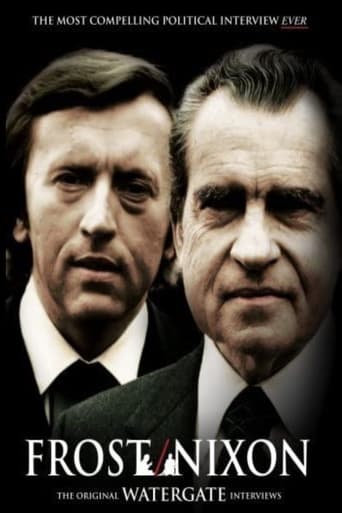l_rawjalaurence
This documentary consists of a series of interviews with former heads of Shin Bet, the Israeli Secret Service. They outline their work in protecting the country's interests, especially since the Six Day War of 1967, while reflecting on the morality of their actions. The film illustrates some of their maneuvers with the help of archive footage and reconstructions. What makes THE GATEKEEPERS so intriguing is its contradictory viewpoints; on the one hand many of those interviewed believe that it is their duty to protect Israeli interests at all costs, even if it means incurring collateral damage. If they targeted a particular Palestinian suspect, they accepted as a matter of course that innocent people would get killed, however much they tried to pinpoint their campaign. While accepting to an extent the Palestinian claims to their own separate state, the interviewees nonetheless have a jaundiced view of the methods their rivals employ: why should Palestinians believe they have achieved their revenge simply by making the Israelis suffer? Yet perhaps what is most interesting is the way in which the interviewees criticize their own government for perpetually pursuing militarist policies, and refusing to meet the Palestinians round the negotiating-table in a sustained way. The Oslo accords of the mid- Nineties represented a step in the right direction, but they collapsed within seven years. Since then, most Israeli Prime Ministers have been preoccupied with pursuing aggressive policies against the Palestinians. The interviewees understand that they, the Israelis, are the colonists, adopting modes of behavior which they themselves experienced in the past at the hands of the British. Perhaps greater care needs to be taken in the future about pursuing a more liberal policy; but the interviewees seem fairly pessimistic about this actually happening. THE GATEKEEPERS might not be a particularly dramatic film, but it is an invaluable text that helps to unravel the complexities underlying the Israel-Palestine conflict.
Roland E. Zwick
Those with a deep and abiding interest in the problems of the Middle East will find much food for thought in "The Gatekeepers," an Oscar- nominated documentary about the Israeli intelligence agency known as Shin Bet. And those who are but casual observers of that part of the world may learn a thing or two as well.The selling point of the movie is that for the first time ever it managed to get a number of the past leaders of Shin Bet to comment on their experiences with the organization. Directed by Dror Moreh, the movie begins with the Six Day War in 1967, goes through the various periods of turmoil and attempts at peacemaking that have gone on there through the decades since (including the assassination of Rabin), and ends in the present day when technological advancements have made surgical drone strikes the preferred weapon of choice in the seemingly never-ending battle against terror. As such, the movie provides a fascinating and surprisingly cohesive history of life in that geopolitical hotspot over the past half-century, all without any voice-over narration, using only the extemporaneous words and comments of the men who played such a major part in that history. In moments of intense self-reflection, the men offer surprisingly candid comments regarding what they've had to do in their role as protectors of the nation. They re not afraid to delve into the grayer areas of the issues, for instance expressing regret over the "collateral damage" of innocents often caught in the crossfire of war, admitting to the mistreatment of prisoners, and agonizing over the dehumanization that results from sectarian prejudice and fighting. A number of them ponder the distinct differences in motive and approach between the politicians setting the policies and the people assigned to carry them out. Above all, to a one, the men reserve their harshest criticism for themselves, Shin Bet and their own country, often expressing sympathy for the Palestinians for what they've had to endure under Israeli occupation and questioning much of what Shin Bet and they themselves have done over the years, the mistakes they've made. Most agree that the most important thing Israel can do is to keep talking to its enemies. As such, I can't imagine this film went over too well with the hardliners in that country. As one of the men says, the farther one gets from one's time as leader of Shin Bet, the more "leftist" one becomes.I don't know if that's true, but it makes for a fascinating theory. And there are many more unexpectedly eye-opening and paradigm-shifting moments to be found in "The Gatekeepers."
chuck-526
It's very interesting to hear a portrayal of trends and events in the Israeli territories over the past almost-half century from intelligence professionals (individuals who don't stand for election and are typically somewhat wary of professional politicians). None of these six surviving former heads of Shin Bet during that period has ever participated in extensive filmed interviews before. (They are just now beginning to take on a higher political profile though, and are likely searching out good platforms. So perhaps this film isn't quite as miraculous as it's usually portrayed.) There is no "voice of God" voice-over narration. And on screen texts (more in the form of subtitles than intertitles) are very brief and sparse. What we get is the interviews themselves; the director's voice is circumscribed to the editing.The interviews of course focus on notable successes, major failures and scandals, and significant shifts in tradecraft. What must have been extensive raw footage from multiple interviews has of course been highly edited, so we see the more tightly organized result. What we see is organized thematically, even to the point of parts of different interviews that comment on the same theme being presented together. The filmmaker has been scrupulous about accurately presenting what the interviewees actually said. They all showed up for the opening of the film, which suggests they didn't feel "tricked". At the same time, it's clear the filmmaker made it very easy for them to say unexpected and controversial (maybe even "peacenik") things.Less than half the screen time is talking heads. Often the interview audio continues over photos and videos of the events from various perspectives. Particularly the group shots and the snaps of famous individuals look like someone spent lots of effort researching in newspaper and TVnews photo and video morgues. There are also lots of what appear to be surveillance videos, banks of computer monitors, and groups of microfiche readers displaying intriguing content. Soon enough the viewer realizes these are all mockups created by special effects wizardry. While some "documentary" films make a point of showing only the reality in front of their camera, and others have told their story partly with a few short snippets of effects (usually animations, often animations of maps), I'm not aware of any other documentary that uses special effects anywhere near this extensively. The length of the credits list too makes it clear this is an atypical documentary.Reading between the lines, the principal criticism of the various Israeli governments these former Shin Bet heads make is that electoral considerations have frequently prevented governments from taking an action that might have resolved an issue. I noticed two other rather startling analyses in the film: One was that while most Israeli governments have made negative statements about Israeli settlements on Palestinian lands, no Israeli government of any stripe has ever taken any significant action to stop a settlement. The other is that in terms of what they actually did or didn't do (not just what they said) to the Palestinians, Menachem Begin and Golda Mier were pretty much the same.Their evaluation of their actions is almost entirely in terms of "what worked" (in the short term), and is often notably different from the common wisdom. The film overall hews very closely to this view too; it doesn't try at all to draw any sort of "bigger picture". My own view (hardly related to the film at all:-), is this "professional tunnel vision" --trying so hard to do a good job of whatever's at hand one is oblivious to any "big picture"-- is yet another example of a serious common problem in today's world. From the film, the lack of any "big picture" strategy as the Israelis have dealt with the Palestinians over the years is pretty obvious.
jdesando
"These are philosophical questions, not practical ones," Yaakov Peri If the Arab-Israeli conflict interests you, then take a close look at The Gatekeepers, a first-rate documentary about Shin Bet, the Israeli security agency primarily responsible for Israel's complicated relationship with Palestine, for both good and bad.Director Dror Moreh has the six former heads of the agency speak as candidly as is possible for men were cautious in the extreme about safety and negotiation, causing death, destruction, and reconstruction to people who just can't seem to settle their differences.As a one-time head avers in the quote above, for the leaders of the agency, founded in 1949 immediately after Israel declared its independence, the decisions of Shin Bet most often depended on the tactic rather than the strategy. Such a mode led to the Bus 300 affair in 1984 with Israeli operatives beating two Arab bus hijackers to death upon orders from Avaraham Shalom, head of the agency at that time. The decision, according to him, was a matter of not having to deal with the terrorists in arrest. And you thought drones were cold.Ruthless and efficient as Shin Bet is, it couldn't stop Israeli Prime Minister Yitzah Rabin's assassination in 1995, even when it knew the identity of the assassin beforehand. Yet the documentary's thrust, ruled as it is by seasoned intelligence officers who lack self-recrimination, is that the agency did what it had to do and was on the whole successful protecting Israel.As the film moves toward its end and the elderly leaders ruminate, one states he has moved toward the left in his old age, suggesting that decisions to accept collateral damage to civilians were necessary but regrettable. As I watch in fascination, I could only think how nice to be able to live with oneself and shift on the political spectrum with barely a scratch.The Gatekeepers, deservedly nominated for a 2012 Oscar, does what a good doc should do—lets the subjects talk for themselves and thereby cleanly exalt and exonerate themselves without directorial intrusion (except in the editing room, of course).Closer to the truth of the occupation's collateral damage, Shalom evaluates himself and his fellow leaders: "We have become cruel to ourselves but mainly to the occupation."



